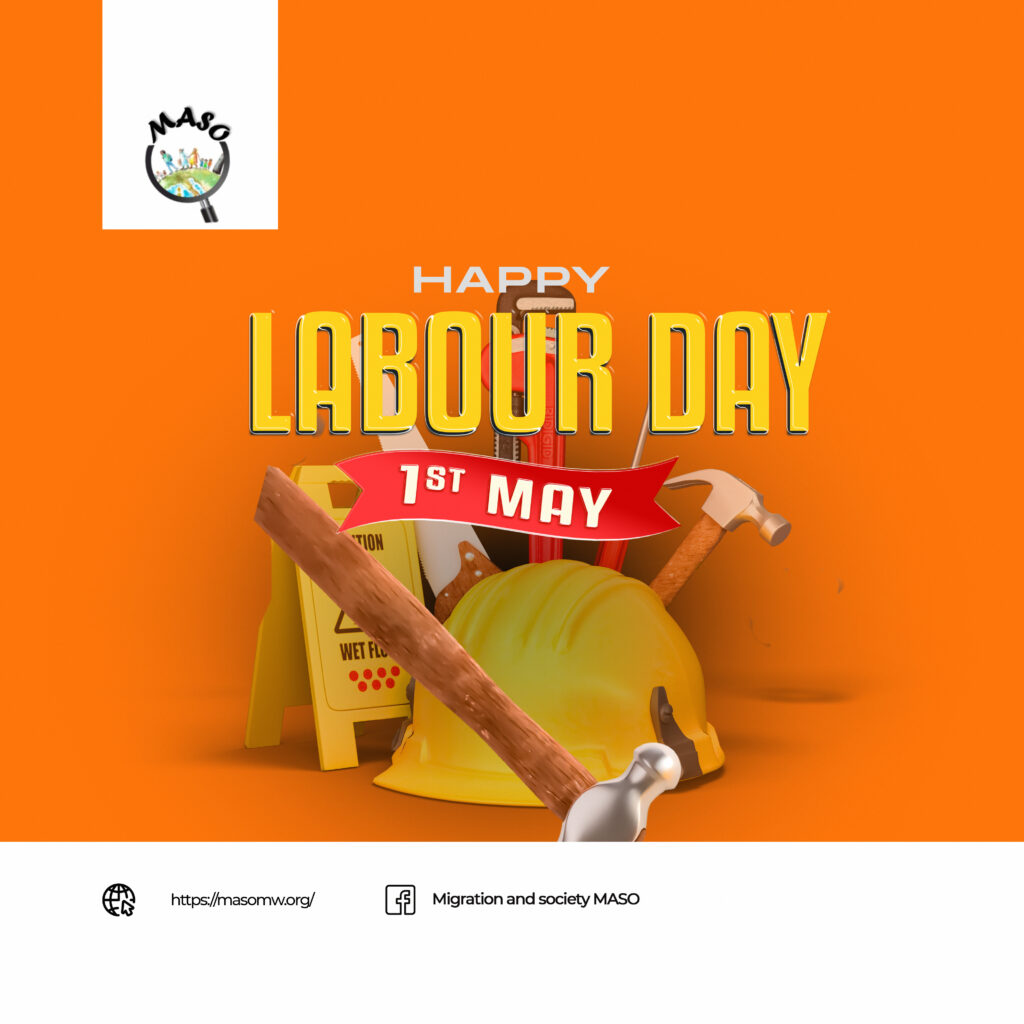“All labour that uplifts humanity has dignity and importance and should be undertaken with painstaking excellence.” Martin Luther King Jr.
Migration and Society (MASO) today joins the the working communities in Malawi, both in the formal and informal sectors, in commemorating Labour Day. These workers may either be employed or self-employed, on the one hand, and may be doing businesses or any other income-earning activities, on the other hand. In all their endeavors, the ultimate goal is to be able to earn a living. As a moment of reflection, the basic question is: through these various forms of engagement, are the workers able to earn a decent living? Are they able to enjoy the fruits of their labour? While for some workers the answer to such questions would be positive, for others, it is not.
The first category of workers are farmers. For the majority of Malawians, their mode of survival is through farming. However, this year farming is wrought with unimaginable challenges: from ever-increasing prices of farm input, including fertilizer and seed, to inadequate, very erratic and highly unreliable rains. Consequently, most farmers have poor crops and expect relatively low yields. In some scenarios, the situation was so bad that the farmers were compelled to replace the planted crops through re-planting, only to be met by a fast-tracked end of the rains, hence wilting and drying up of the crops before actual maturity. The production costs of most crops soared during this growing season following uncontrolled increases in prices of input, especially fertilizer. This was orchestrated by the faltering of the Malawi Kwacha against the international currencies, for example, the US Dollar, British Pound and the Euro. During the 2024-2025 growing season, fertilizer averaged MK70,000, but this year the price started around M70,000 but kept on rising and by February 2025, the 50 kg bag was hovering between MK 110,000 and MK130,000. This was way beyond the reach of most ordinary farmers. These farmers were forced to rely on both formal and informal loans which themselves attract huge interests. This scenario shows there will be diminishing returns from the various crops at the end of the growing season.
In spite of this gloomy picture, there are obviously some farmers who are full of hope that they will have bumper harvests this very growing season. This depends on such factors as amount of rains received in respective areas; the variety of the crops (some varieties are drought resistant); and the preparedness of the farmers ahead of the growing season: some farmers made early purchases of farm input while prices of various input were still relatively low. In line with the latter, such farmers were not negatively affected by increased prices, especially since January 2025. In short, not everybody is a victim, but it is worrisome because the majority of the farmers have been caught in the high crop production costs trap!
Apart from farmers, the other category of workers in Malawi are those in businesses. While some businesses, for instance, big companies belong to the formal economic sector, the majority belong to the informal sector. It is those workers in the informal sector that should have been badly hit by the weakness of the Malawi Kwacha. Prices of various goods, including transportation, have gone up. In some cases, the prices have increased by 80 or 100 per cent. The direct implication is that for small-scale business operators, it is extremely difficult for them to stock their grocery and hawking shops because of inadequate capital outlay. On the part of their customer base, the sudden and impulsive changes in the selling prices of various commodities have affected the buying power, since these customers have resorted to cheaper alternatives. This includes buying cassava and sweet potatoes for breakfast instead of bread and rice. One hopes that this situation should improve before some small-scale business owners are forced to fold up their business initiatives. But lol, haven’t some already closed their businesses because of this chocking business environment?
A third category of workers are those who belong to the formal class or proletariat: the full-fledged workers or proletarians. These belong to the formal sector and survive almost wholly through a wage or a salary. The weakening of the Malawi Kwacha and the consequent increase in the prices of most consumer goods have dealt this category a heavy blow. May be the question would be, why is this the case? Simple: because their salaries have remained the same and yet prices of goods including maize, rice and flour have gone up. So in short, with the same salary (which is already relatively low), a worker needs more money to cover transport, rentals, school fees and basic consumer goods in order to make ends meet. As a case in point, a loaf of bread was selling at MK1,500 in December 2024, but has gone up to an average of MK3,200 in March 2025. Transport fares have almost doubled: where passengers were paying MK3,000, they are now paying between MK5,000 and MK6,000. With this simple arithmetic (I don’t want to talk about mathematics to avoid complications), is it not difficult to see that most workers including civil servants and public servants are feeling the economic pinch in the first half of 2025.
The foregoing analysis is simply reflective of the situation that is generally obtaining on the ground. Of course, not all workers have been affected in the same manner; in fact, for others the situation may as well be better and already improving. However, that not withstanding, this account is concerning the majority of ordinary Malawians not only in the rural set up, but also in urban centers and towns. This is why Migration and Society (MASO) argues that instead of merely commemorating this year’s Labour Day as a matter of annual routine, why can’t public and private sector agencies and institutions including state institutions take this as a moment of reflection: thinking deeply about the financial woes of workers and, as a solution, thinking critically about how to play a part towards improving this gloomy scenario and predicament?
Migration and Society (MASO)
Local Challenges, Global Perspectives

